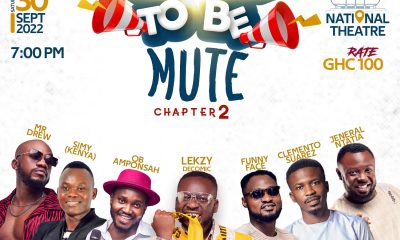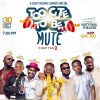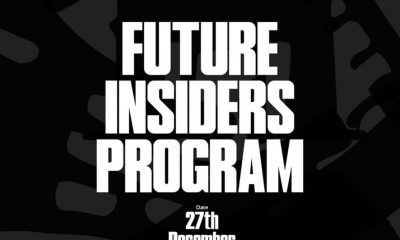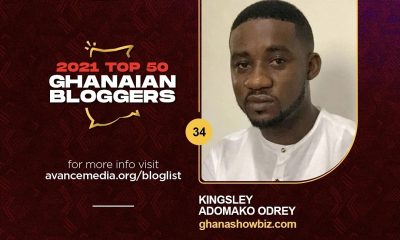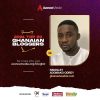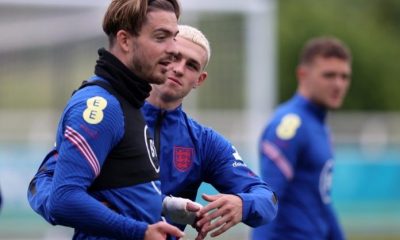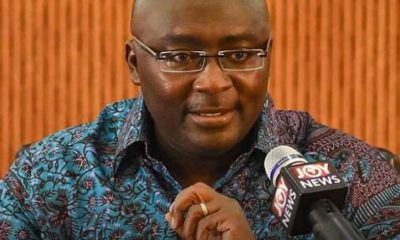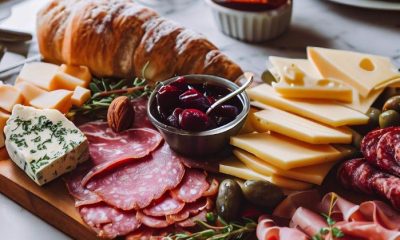Events
Nana Kwame Ampadu receives Life Time Achievement Award
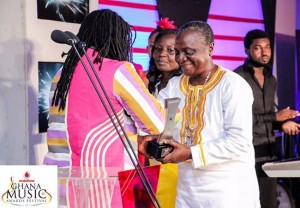 The Industry Awards night for 16th edition of the prestigious Vodafone Ghana Music Awards was held at the Alisa Hotel in Accra Monday night.
The Industry Awards night for 16th edition of the prestigious Vodafone Ghana Music Awards was held at the Alisa Hotel in Accra Monday night.
The Industry Awards night, which precedes to the main awards night, honours distinguished personalities in the music industry who have excelled over the past year.
Unlike the main awards, the Industry Awards categories are not voted for by the general public. In all 10 personalities received awards on the night.
The event witnessed some exciting performances from Emelia Arthur, Efya, Ras Kuuku, Raquel and Nana Kwame Ampadu, who received the Lifetime Achievement Award for this year.
The main awards will be held at the Accra International Conference Centre (AICC) on Saturday, April 11 2015.
Below is the full list of winners:
Gospel Album of the Year – Evangelist Diana Asamoah
Record of the Year – Koda
Songwriter of the Year – Wiyaala – Africa
Producer of the Year – DJ Breezy for ‘Seihor’ Castro ft. D-Black
Sound Engineer of the year – George Forest
Traditional Artist of the Year – King Ayisoba
World Bank Music for Development Award – Nii Okai for his Mokobe @10 Saving Hearts Project
Instrumentalist of the Year – Frank Kissi
MUSIGA Merit Award – J.V. Owusu
Lifetime Achievement Award – Nana Kwame Ampadu
Nana Kwame Ampadu’s biography:
Patrick Steel Kwame Ampadu alias PSK Ampadu is one of the most successful musicians in the country whose early struggling beginnings serve as a success story to encourage young musicians that there is always a light at the end of the tunnel.
BEGINNINGS
Kwame Ampadu, of the African Brothers Band fame, like most musicians, fought his way through rocks and thorns to reach the musical zenith in Ghana. The journey to the top was long, dangerous, steep, and tiring but he patiently cleared each hurdle one after the other with patience, dedication and determination. He now echoes success and he is a standard of measure to some aspiring musicians in Ghana.
He was born to Opayin Kwame Ampadu (farmer) and Mercy Afua Ntiriwaah (housewife) both of Obo-Kwahu, Eastern Region. Although Ampadu is not absolutely sure of his date of birth, my research confirmed that he was born on March 31, 1945 (Easter Saturday). He schooled at Obo and Afram Plains (Owurobon), Government School and Roman Catholic primary schools respectively. He came back to Obo Anglican Boys School to complete his elementary education from 1956 to 1959.
At Anglican Boys, little Ampadu was a member of the school choir and the tiniest boy of his peers. Despite his size he won the prestigious and enviable position as “tune giver” in the group. It may interest readers to note that the school had no piano so in order to strike a chord (key) for the choir, he was trusted to do that job because of the quality of his voice. For Ampadu, the road to secondary education was blocked since his father refused to pay for entrance fees to Abuakwa State College (Kyebi) and Ebenezer Secondary Schools (Adabraka, Accra) after passing the almighty common entrance on two occasions.
SURVIVING
Out of frustration Ampadu journeyed to Accra in search for job but his dwarfish structure became an obstacle as employers refused to hire him. Ampadu was thought too little to stand the test of living independent life though he had a giant’s brain to manage his own affairs. Ampadu agreed that he was physically small for any employer to hire him. He says, “Kwame, I was too small for my interviewers to give me a job.”
The jobless desert of the city of Accra saw Ampadu returning to Kwahu Mpraeso, which became an oasis for him to rest and drink. He secured a job as a messenger with the Ministry of Agriculture, Mpraeso and for ten months in 1960, he was guaranteed of a monthly paycheck. He calls this “ani bo a eko tiri mu.” (When the eye closes it goes back to the skull). Ampadu, who contemplated going to the nation’s capital for the second time, sneaked back to Accra upon an invitation from a friend, Noah, without informing his employer.
Unfortunately, he missed this friend, who had left Accra for Asante Akyem Agogo to play for a band a week earlier. The dreams of this form four (standard seven) leaver was almost shattered when P. K. Yamoah and his band came to the rescue after a relative of Ampadu introduced the desperate and disappointed tiny youngman to Yamoah.
Yamoah was a bandleader and salesman for Guinness Stout Limited, a brewery company in Accra. Ampadu received another knockout blow in his life. Four years into courting with Yamoah, the bandleader was transferred to Kumasi so he moved with his group, the Yamoah’s Guitar Band in the early 1960s to Oseikrom but the Kwahu man (Ampadu) was scared of the garden city, Kumasi, which later became the cornerstone of his success. Ampadu stayed in Accra and got back to the rhythm of job-hunting again. He, however, vowed not to go back to the Mpraeso Ministry of Agriculture since he vacated his post unceremoniously.
AFRICAN BROTHERS BAND
He galloped from job to job and finally settled with the Ghana Farmers Council as a messenger and later Canteen keeper (Beer Bar attendant). He had then, since the departure of Yamoah from Accra to Kumasi in 1963, formed his own group, the African Brothers. It was an amateur group that played gigs mostly on weekends.
The name of the band, according to Ampadu, was in support of Dr. Kwame Nkrumah’s call for African unity. Ampadu was laid off from the Farmers Council after the 1966 military coup. The Afrifa’s coup, the first military coup in Ghana, probably opened heaven’s gate of success for Ampadu. He became disappointed from joggling between jobs so he decided to play full time with his group but the initial struggle to get his music on wax became a pain.
The Kaikaikus, E.K.Nyames, Kwabena Onyenas, and Dr. K Gyasis were the musical names to reckon with at the time. So breaking through the ceiling was almost impossible. Record producers were simply not interested in him. In fact, his physical structure did not command any qualities of becoming a good bandleader. He however, relied on his composition skills and composed for other bands.
After providing eight (songs) compositions to Jerry Hansen’s Ramblers Band International, Hansen introduced Ampadu to one Joe Eyison (the late Station Master of Obrah Fame) of Philips Records Company, West Africa Limited. Through the help of Eyison, the company auditioned Ampadu and his first two songs with Philips became instant hits, “Aganka Dabre and Sominaso Ntonko” on 45 PRM records. He made it to Kumasi in December 1966 for some Christmas gigs where his live performances were more profitable for his kind of guitar band music.
The Kumasi fans and music lovers instantly accepted him. After series of such gigs he was spotted as an icon with a lot of untapped potentials. The owner of Ambassador Gardens Hotel, Amakom Kumasi, provided the group with free accommodation, which made them the residential band for the hotel. Ampadu says, “the Ashantis welcome me and I felt at home with my group.”
PRODUCERS
By the middle of 1967, the popularity of Ampadu and his African Brothers Band were all over Ghana. Record producers ‘chased’ Ampadu to Kumasi to do business with him. He says, “I was overwhelmed by the attention I got but wasn’t sure about contracts. I just wanted my songs to get out.” One A. K. Badu, owner of Ambassador Records Manufacturing Company, Ejusu, Kumasi, had the first bite and recorded eight songs with the group.
There were other producers who also recorded Ampadu’s songs but D. K. Nyarko from Obo-Kwahu, Obooba Records, had the lion’s share of what Ampadu had to offer the nation.
Nyarko bought a set of new musical instruments for the group and every recorded song of the African Brothers Band became a hit. D. K. Nyarko recorded all songs by Ampadu from 1967 to 1978. After this period, Ampadu became his own producer, secretary, public relations officer, and marketing director leaving the post of manager to his senior brother, Kofi Amo. Ampadu capitalized on his popularity and toured every corner of country with his style of music. He was simply a crowd puller.
TOURS
The group toured the Great Britain in 1971 with success and several times to neighboring West African countries including Cote D’Voire and Nigeria. He also flew to the US twice in the 1980’s and was very active at home both in recordings and live performances. “Nana anaa,” as he was affectionately called, never missed an engagement during his days.
“It is my profession,” he emphasized, “and I had no reason for not going to work.” One thing that made this musician a force to reckon with was his philosophical and proverbial lyrical arrangements. For example in songs like, “Ebe Tie Yie, Okwaduo, Article 204, Biribi Betumi Yen, Kukurukuru, Ke afee atee le, ateo anaa” (Ga language) and a host of others were some of the deep thought lyrics whose meanings could be deduced by matured thinkers and not ordinary speakers of the language.
Though he never admitted that he composed songs to attack politicians, some of his songs reflected the uncompromising political situation at the time. He used a lot of figurative expressions in his songs to describe the day-to-day happenings in real life situation. For example, “Nkran Abrabo” (Economics Nkoaa) and portrayed the hardships of the capital city of Ghana as government worker. He recorded several 45s and hundreds of Long Playing (LP) albums.
He was also fun of using animal imagery to set his messages across. “Okwadoo, Somu Gye Wakrantie, and Osibo (Mecca)” were some of the animal story songs. For over a period of over 30 years, Ampadu was able to keep pace with the changing rhythms on the musical scene in Ghana.
IMPACT
Ampadu never left his youthful fans behind. He blended his lyrics with danceable instrumental arrangements executed by dedicated bands men. His music had very good impact on his fans if not the country as a whole. Songs like “Sanbra Konadu, Odo Nti, Julie, and Agatha never missed the stylus of most GBC programmes in both radio stations (GBC-1 and 2). Unlike some compositions of today, Ampadu’s songs were comforting and advisory in nature and content.
There was a time in one of the District Courts in Accra where the defense counsel played one of Ampadu’s songs, “Asembi Ye Nkrabea,” to convince the jury and the judge that the defendant just happened to be at the wrong place at the wrong time proving the defendant’s innocence.
His name was changed from PSK Ampadu to Nana Kwame Ampadu I when in 1972 he won the national Hi-Life competition held at Rex Cinema Hall, Accra. Among the competitors were Abrekyieba Kofi Sammy and his Okukuseku, Kwabena Akwaboa, CK Mann and a host of other.
Some of the original members of the African Brothers Band were Snr. Eddie Donkor (Vocals and Guitar-Rhythms), Kofi Amo, Joe Dee (Guitar, Bass), Maxwell Teacher Boateng (Vocals), A.K. Ofori (Guitar and Vocals) and Oppong Kyekyeku (vocals). Ampadu now boasts of training over 10 successful bandleaders in Ghana and several other musicians who schooled in his camp. These include but not limited to Nanaba Amoako, Prince Osei Kofi, Seth Kwame Aseidu (Virginia, US), Ogya Osae and Hungo (former organist, now a professor in music, PhD., in the US). Ampadu also trained some female musicians and helped them to record their own songs, for example Mum Bea, Akosua Agyepong, and Abena Nyanteh.
INFLUENCE
Though he has retired from active live performances except for fundraising, exhibitions and charity shows, he produces, trains young musicians, and rearranges some of his old tunes in a studio at his Abeka-Lapaz home. He has recently moved from recording secular music to gospel songs. His vision is unity and prosperity among Ghanaian musicians, something he championed in his hey days. He, at one time in the late 1970s, challenged the Ghana Broadcasting Corporation for not properly logging records played on air.
In fact, he demanded that proper royalties be paid to musicians whose music were used. He also encouraged other bandleaders to help crackdown the problem of piracy in Ghana hence the seal of authenticity on cassettes sold in Ghana. Ampadu and the African Brothers Band were the first musical group in Ghana to play only their own music during concert shows. He however, regrets that a country like Ghana has misplaced its leading tempo and anglicized it to be known as hi-life, which is a foreign term.
He is very optimistic that gradually the Adowa, Osoode and other rhythms of Ghana will come back to light if the educational institutions started to incorporate them in their syllabuses. Despite his achievements the musical maestro of Ghanaian highlife, like most local musicians, could not penetrate into the international scene.
This is a subject that I will discuss later in this column to find out whether the inability of highlife music not been popularized is either due to lack of marketing or is the rhythm, which is not acceptable to other nationals. He is of the opinion that music as a profession is not for the dropouts in society. He, therefore, advocates that our educational institutions pay particular attention to music. This, he argues, will help to encourage those who are musically talented and want to take it as a profession.
myjoyonline.com

